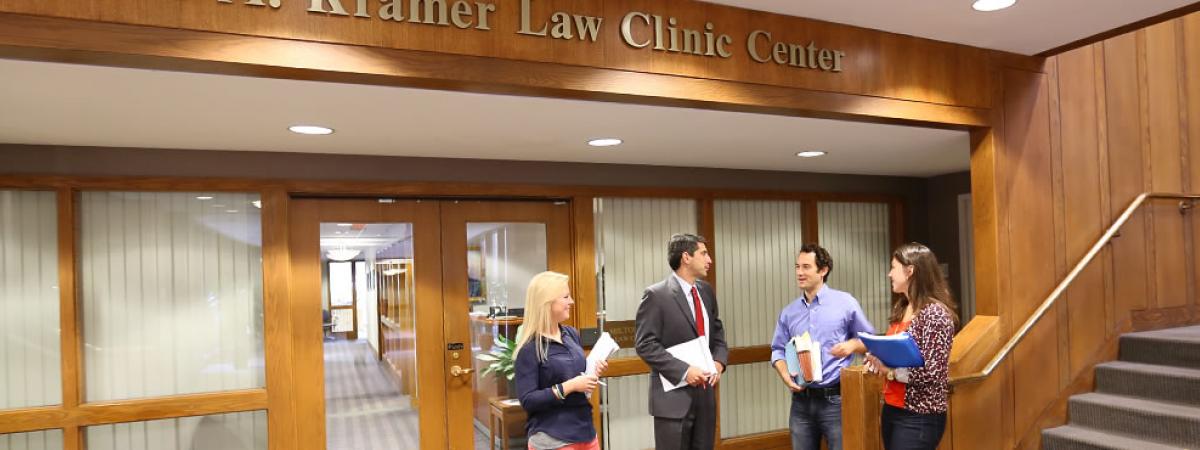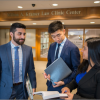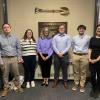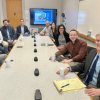We Are Leaders in Experiential Education
All of our students work to solve the client’s real-world problems. And, depending on the clinic or externship you take, your experience can include writing briefs, arguing in trial or appellate court, or presenting to boards of directors or organizations.
Milton and Charlotte Kramer Law Clinic
We were one of the first law schools in the country to start a clinical program. We opened to the community over 50 years ago, a long-standing history that demonstrates our commitment to clients, to the highest-quality representation and to excellence in education. Our clinic is a law firm within the law school and is staffed with faculty members who have years of practice experience themselves. You will represent clients and client groups who can’t afford their own lawyers. Our clinic handles hundreds of matters per year for a total of approximately 24,000 hours of pro bono legal work.
Each student takes primary responsibility for his/her caseload. Cases are often complex and include ongoing representation of organizations, civil, criminal and administrative appeals, consumer disputes, disability rights, fraud claims, emergency commitment and competency hearings, patentability and patent applications, trademark and copyright issues, misdemeanor and felony cases in adult and juvenile court, defamation cases, and applications for relief from deportation. The ten clinics in our center each provide experiences in different areas of law.
Appellate Litigation Clinic
The Appellate Litigation Clinic offers students the opportunity to work on multiple appeals over the course of a single semester or, subject to student performance, a full year. Our clients primarily seek relief from criminal convictions, although occasionally we represent parties in appeals from civil matters. The issues on appeal run the gamut. Some clients seek relief from convictions based on guilty pleas they now wish to withdraw. Others believe their convictions were the product of error at trial. And some cases present only sentencing issues. No matter the issue, students interview clients (sometimes in correctional facilities), pursue any necessary post-judgment relief in the trial court, prepare the paperwork to initiate the appeal, ensure the completeness of the record, handle any settlement conferences/discussions and research/draft the appellate briefs. We routinely pursue cases to the Supreme Court of Ohio and/or the Supreme Court of the United States if circumstances warrant; one of those cases reshaped Ohio law on the process for withdrawing a guilty plea. There is heavy emphasis on written advocacy, appellate procedure, strategic case planning, professional conduct and oral advocacy. Students who elect to continue into the spring semester will likely have the opportunity to conduct at least one oral argument.
Community Development Clinic
This is a year-long course; students must complete both semesters to receive course credit. Students represent organizations and businesses in the role of corporate counsel. They develop skills and gain experience conducive to success in transactional and corporate practice, and work directly under the supervision and with the support of experienced faculty in a feedback-rich and collaborative law firm environment. In doing so, they also play a role in local efforts to improve Cleveland and create opportunities for its residents. Community Development Clinic (CDC) interns can expect to represent both start-ups and established organizations. The CDC’s client portfolio typically includes a variety of community development, arts, social service and workforce development non-profit organizations, for-profit social enterprises, microbusinesses, cooperatives and community groups. CDC students can expect to assist and advise clients on the formation of business entities, corporate governance issues, planning and conducting activities in compliance with laws that regulate them, structuring tax, real estate and corporate transactions, drafting and negotiating contracts and basic intellectual property matters.
Criminal Justice Clinic
Students represent clients who are unable to hire private lawyers in a variety of misdemeanor criminal cases in municipal courts within Cuyahoga County. The students are assigned as first-chair legal representatives on cases ranging from assault, domestic violence, petty theft, disorderly conduct, resisting arrest and a variety of traffic offenses. The seminar component of the course provides in-class instruction on the legal and practical skills needed to provide exemplary criminal defense representation. At the conclusion of the semester, students have first-hand experience: interviewing clients and witnesses, conducting investigations, propounding and responding to discovery, preparing and arguing all pre-trial matters, representing clients at trial and, when necessary, advocating on their client's behalf at sentencing.
Environmental Law Clinic
The Environmental Law Clinic is an interdisciplinary legal clinic that addresses environmental law and policy problems on behalf of individual clients and organizations including environmental groups, nonprofits and community organizations. Students work on a full range of environmental issues but focus predominantly on environmental and energy justice concerns in Northeast Ohio. The Clinic combines teaching, student practice, policy work and impact litigation, as appropriate, to ground students in movement and community lawyering to address environmental justice issues within the region and aims to take action in matters with significant interest and/or impact in the community.
First Amendment Clinic
The Dr. Frank Stanton First Amendment Clinic is a litigation-focused experience in which we represent clients dealing with First Amendment speech issues—even (and perhaps especially) when potential clients need representation to defend against government interference with unpopular speech. We are a fast-paced litigation clinic that often deals with relatively high profile matters representing clients in civil rights and speech-defense litigation. This includes speakers targeted or retaliated against by the government for their expression, artists facing government censorship, and speakers/publishers facing tort lawsuits for expressing their opinions or for criticizing public figures. We teach real-world litigation skills through the lens of civil litigation—depending on the status of our matters, we might be researching legal issues, gathering facts, resolving ethical issues, drafting pleadings, conducting discovery, drafting and arguing motions (including dispositive motions), negotiating and enforcing settlements and, if necessary, trials and appeals. We may also provide public training and commentary for relevant current issues that implicate free speech.
Health Law Clinic
Students in the Health Law Clinic will participate in an interdisciplinary and collaborative effort bridging Cleveland’s health and legal ecosystems to address and improve social determinants of health. Students will work alongside health care professionals, community service providers and community members to holistically address the legal and social issues that impact their client’s health. Through direct legal services, training and systemic advocacy, students will address the civil legal needs that can profoundly affect health. Social and environmental factors, such as income, access to health care, access to benefits, access to housing, health housing conditions, access to healthy food, education, job stability and personal safety, all have an impact on health.
In recent years, students have appeared in administrative and civil court proceedings representing children and adults in a variety of cases including social security eligibility and overpayment cases, wills and advanced health care directives, state administered public benefits, guardianship cases, eviction and housing condition cases, and access to and payment for health care. Our client base will include individuals with mental health and/or substance abuse problems, members of the LGBT+ community, refugees and Veterans.
Human Trafficking Law Clinic
The Human Trafficking Law Clinic (HTLC) is an interdisciplinary program (social work and law students together) that works on three systems levels (direct representation, community outreach and education and legislative advocacy) to provide comprehensive legal assistance and trauma-responsive social services to adult sex and labor trafficking survivors and those populations with heightened vulnerability for trafficking. Targeted populations include identified sex and labor trafficking survivors, members of the lesbian, gay, bisexual, transgender, queer (+) (LGBTQ+) community, individuals with substance use problems or experiencing housing instability and individuals living under 300% of the Federal Poverty Level.
The HTLC focuses on legal wellness (preventive legal screenings and issue identification), direct civil legal representation and referral to social service agencies to address the holistic whole-person needs of clients. The combination of our legal focus combined with the addition of social service support assists with the sustainability and stabilization of the clients that we engage. General areas of the law that we assist with include: expungement and record sealing, name and gender marker correction, protection orders, social security benefits, warrant block identification, fee waiver requests, identity theft, child support modification, driver’s license reinstatement and debt negotiation.
All students go into the community to conduct outreach and intake. In addition, students are given the opportunity to provide community-based trainings and education and awareness events around human trafficking.
Students are given the opportunity to participate in monthly Legal and Legislative committees in the community and Statehouse, working groups as part of the Collaborative to End Human Trafficking and specialty groups with the Ohio Attorney General. As a part of these memberships, students conduct research, participate in drafting and input and provide input and insight on community awareness projects. Invitation and attendance at the Statehouse for advocacy days is possible.
Immigration Clinic
Students represent non-citizens before various governmental agencies including US Immigration Courts, US Citizenship and Immigration Services (USCIS) and Immigration and Customs Enforcement (ICE). Students will work individually or in teams on client matters both in person and through various forms of communication. Examples of work to be conducted include representing non-citizens in applications for relief from removal or deportation, asylum, withholding of removal and protection under the Convention Against Torture; bond hearings and assisting clients with applications for Naturalization and/or permanent residency applications, affirmative asylum and various other immigration remedies.
Intellectual Property (IP) Venture Clinic
The Intellectual Property Venture Clinic (IPVC) offers comprehensive trademark and patent prosecution assistance to individuals and businesses in Northeast Ohio. Our clinic is committed to fostering the next generation of intellectual property attorneys while also supporting intellectual property in the area.
In the IPVC, students engage directly with clients and the U.S. Patent and Trademark Office (USPTO), working under the supervision of licensed patent and trademark attorneys. The USPTO has certified the IPVC under its Law School Clinic Certification Program, which gives our students limited recognition to practice before the USPTO. This also allows our clinic to designate a set number of applications for expedited examination under a Request to Make Special, in order to provide our students with more immediate feedback within the semester.
Second Chance Reentry Clinic
Students will represent individuals facing barriers as a result of their criminal records. The clinic’s cases sit at the intersection of the civil and criminal legal systems and tackle issues related to mass incarceration, prisoner reentry and the collateral consequences of criminal convictions. Cases are dependent on the needs of our clients, but students can expect to work on cases related to felony and misdemeanor record expungement, child support, visitation and custody, restoration of rights and more. They will work independently, as well as in teams, to develop case strategies, draft court filings and advocate for our clients in courts across Northeast Ohio. Additionally, students may engage in policy and advocacy work related to reentry and the criminal legal system.
Law Clinic News
Graduating Student Spotlight: Kenny Wallace
May 16, 2025Kenny Wallace came to Case Western Reserve to make a difference. What he didn’t expect was how deeply his clients—and his fieldwork—would change him in return.
Case Western Reserve’s Kramer Law Clinic nationally recognized for impactful legal advocacy
May 13, 2025Case Western Reserve University School of Law’s Kramer Law Clinic has been recognized in a national analysis of law school clinics for its significant contributions to legal advocacy and public interest law.
Law students help launch Latino vendor market and community space in Clark-Fulton neighborhood
March 10, 2025Nestled on Cleveland’s West Side, the Clark-Fulton neighborhood plays host to a vibrant Hispanic community, making it the perfect home for CentroVilla25.
Second Chance Reentry Clinic students engage with community
March 04, 2025The Second Chance Reentry Clinic, which is funded by the Cuyahoga County Office of Reentry, spent a lot of time out in the community during the month of February.
Urban Development Lab students go on the ground to study Cleveland neighborhoods
July 17, 2024
A recent study from the Urban Development Lab sheds light on how economic development incentives are performing in places like Cleveland. It finds that “smart” incentives—those selectively awarded, monitored and capable of adaptation—yield greater community impact.







